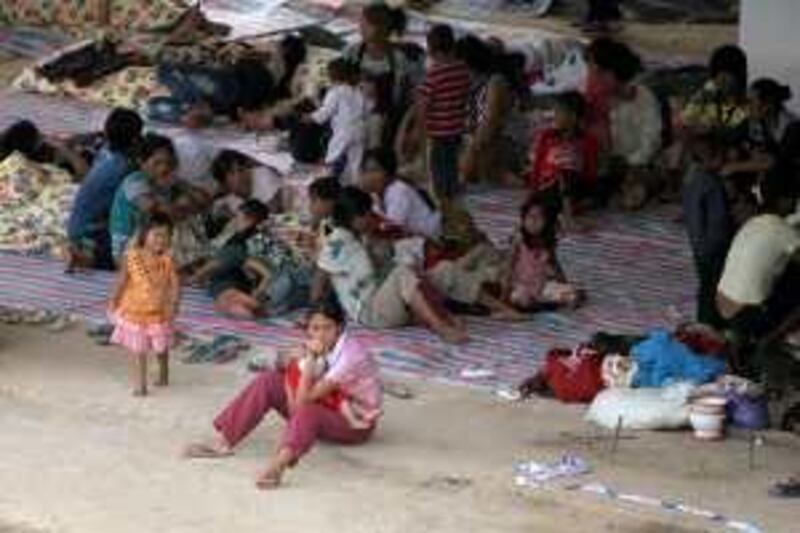BANGKOK // Tensions along the border with China remain high more than a week after Myanmar's army launched a major offensive against ethnic rebels who control the area. The fighting along the border has caused a flood of refugees into China, alarming Beijing and causing concern that its close relationship with the junta may be at risk. More than 30,000 Kokang and ethnic Chinese businessmen fled across the border more than a week ago to escape being caught up in the Myanmar army's attack on the Kokang ethnic rebel group, who call themselves the Myanmar National Democratic Alliance Army.
The Myanmar authorities launched their attack two weeks ago when they entered Kokang territory investigating reports that the Kokang were operating an arms factory, but analysts believe this was a pretext to try to disarm the ethnic group before next year's elections. The state-controlled media now claims that an arms factory in the area had been captured by government troops. At least half of the 1,500 guerrillas also fled across the border, where they were disarmed, disrobed of their military uniforms and given blue overalls to wear, according to Khuen Sai, the editor of the Shan Herald, a dissident news website based in Thailand. They are being held under guard about 5km inside China, he added.
More than half the inhabitants of Mongla city are ethnic Chinese, including more than 8,000 immigrants who have set up businesses there in the past 10 years. The Kokang are one of several armed ethnic groups living along the border with China who have ceasefire agreements with the military regime in Myanmar. The Kokang, who are ethnic Chinese, and their neighbours in northern Myanmar, the Wa, were the first to sign peace pacts 20 years ago, ending decades of fighting for autonomy. Myanmar was formerly known as Burma.
"There has been an uneasy peace in the border areas ever since these ceasefires were agreed, with the armed groups allowed to retain their arms, and for all intents and purposes fully govern the areas under their control without any real hindrance from the central government," according to Win Min, a Myanmar academic and military specialist at Chiang Mai University in Thailand. "But the Burmese offensive against the Kokang effectively ends these agreements."
The Myanmar army now controls Laukkai, the Kokang capital close to the Chinese border. "It's like a ghost town, it's deserted except for armed Burmese soldiers patrolling the streets," Sai Htun, an ethnic Shan who works in a restaurant there, said. "A few people are trickling back, but they are cautious. They fear what the soldiers might do to them." Fears remain that the fighting could become a renewed civil war. Over the past two days the Wa, who have at least 15,000 well-trained and armed guerrillas, have been warning of an attack by the Myanmar army. But many analysts believe this is unlikely - at least for the time being.
"There's a lot of posturing going on, but behind the scenes there is also negotiations - between the Wa and the Myanmar army commanders, and between the ethnic groups trying to form a strong military alliance, in case the Burmese army does attack," Mr Khuen said. The Myanmar army has told China there is no planned attack on the Wa, said a senior Chinese government official on condition of anonymity.
Senior UN officials in Yangon also believe there is unlikely to be an offensive against the Wa, from their talks with Myanmar. But the threat has been enough to send ripples through the usually solid relationship between Myanmar and China. If the two neighbours and allies do fall out, it will have a significant effect on the border region. The most powerful of the ethnic groups in this area, the Kachin, Kokang and Wa, have ceasefire agreements with Myanmar and close ties with China.
Economically and culturally the border region is closer to China than to Myanmar. Tens of thousands of Chinese businessmen and workers have migrated into northern Shan state over the past decade, seeking employment and economic opportunities. The Chinese language and even the Chinese currency, the renminbi, are used throughout the Kokang and Wa areas of Shan. Anything that forces Beijing to choose between their kin inside Myanmar and the central government in Naypidaw will be a major concern. The Chinese central authorities were furious that they were not informed about the operation beforehand, a senior government official said.
There has been much diplomatic activity since, with crucial high-level meetings taking place in Kunming, the capital of Yunnan province, which borders Myanmar, last week. "China may find it has to bow to the Burmese junta's will, as Beijing has more to lose, and will not want to lose its most crucial economic and strategic ally in Southeast Asia at a time when they are anxiously watching Washington re-establishing strong connections throughout the region," Mr Win said.
foreign.desk@thenational.ae





